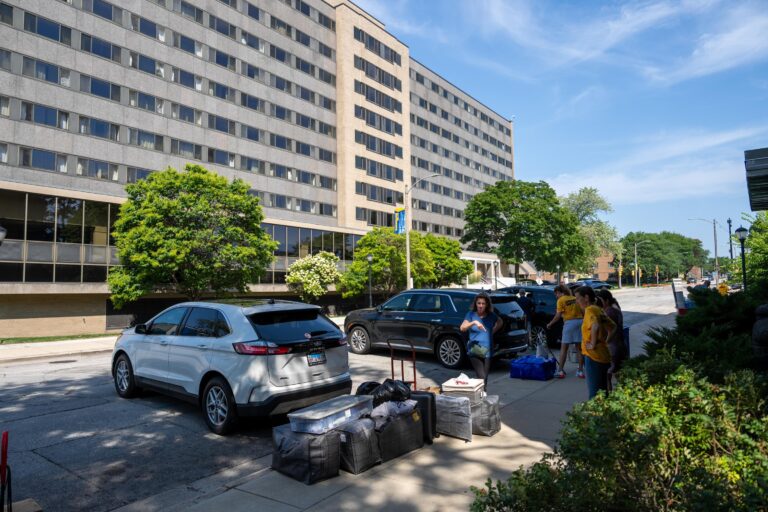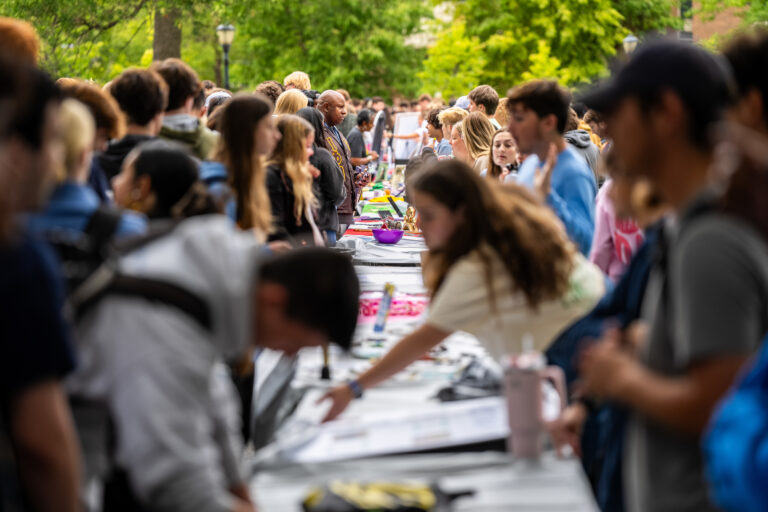Three community-engaged, interdisciplinary programs will be funded to address mental health and wellness and economic revitalization
President Michael R. Lovell announced three project winners for the President’s Challenge for COVID-19 Response, a grant program launched to address needs and opportunities in the Milwaukee community that have been created or magnified by the COVID-19 pandemic.
In partnership with American Family Insurance and with ongoing support from Johnson Controls Foundation, grants of up to $50,000 were awarded to community-engaged, interdisciplinary groups for their work on:
- A study on the impact of safer-at-home orders has on intimate partner violence
- An online toolkit resource for teachers to assist students from disproportionately affected populations with the effects of COVID-19 and systemic racism
- Solutions to optimize public food service distribution to meet the growing need brought upon by sudden unemployment.
“The President’s Challenge, in its short existence, has truly demonstrated the commitment that our faculty, staff, students and community partners have to the service of others,” President Lovell said. “This iteration has been no different as the range of topics and expertise put forth on the proposals submitted is inspiring and impressive. The three projects we have chosen will truly serve a public good and provide support or guidance in critical areas of need in our community.”
Proposals were submitted to address community needs in one of three categories: mental health and wellness, economic revitalization, and health services. The winning proposals were:
When Safer-at-Home is Not Actually Safe: Supporting Intimate Partner Violence Survivors during Quarantine
 Principal investigator: Andrea Schneider, professor of law
Principal investigator: Andrea Schneider, professor of law
This research team seeks to comprehensively understand the impact of the COVID-19 pandemic on intimate partner violence survivors by examining “safer-at-home” policies and their effects on the wellness and mental health of survivors; the shift from in person to online and telephonic access to the court system, particularly when requesting a restraining order and follow-up services; and the effect of pandemic-related employment and economic instability on IPV victims and their abusive partners. Researchers will partner with Sojourner Family Peace Center and the Milwaukee County Court system to help improve services for survivors during this pandemic, to enhance court processes, and to guide best practices in advising workplaces on how to respond to IPV.
Additional team members: Dr. Jennica Webster, associate professor of management; Dr. Sameena Mulla, associate professor of social and cultural sciences; Dr. Heather Hlavka, associate professor of social and cultural sciences; Dr. John Mantsch, chair and professor of biomedical sciences; and Dr. Aleksandra Snowden, assistant professor of social and cultural sciences.
Promoting Resiliency and Improved Coping in Education (PRICE)
 Principal investigator: Patrick Kennelly, director of the Marquette Center for Peacemaking
Principal investigator: Patrick Kennelly, director of the Marquette Center for Peacemaking
The Center for Peacemaking recognizes that Hispanic and African American communities are disproportionately impacted by the effects of COVID-19 and systemic racism. These issues impact children and lead to stressors, fears, and pressures that can negatively impact their mental health and increase barriers to learning and challenges in social interactions. The center has partnered with schools to teach students and support educators in fostering new skills, knowledge, and behaviors that increase resiliency and self-efficacy in young people. This grant will allow the center to partner with Notre Dame School of Milwaukee to develop a web-based toolkit to respond to the current conditions of quarantine and remote learning.
Additional team members: Sherri Walker, assistant director; Olivia Smith, peace education specialist; Chris Jeske, associate director of the Center for Peacemaking; Dr. Gabriel Velez, assistant professor of educational policy and leadership; and Dr. Kristin Haglund, professor of nursing.
Empowering Those Who Seek to End Hunger through Collaboration and Innovation
 Principal investigator: Dr. Walter Bialkowski, visiting assistant professor of computer science
Principal investigator: Dr. Walter Bialkowski, visiting assistant professor of computer science
A dramatic spike in unemployment due to the COVID-19 pandemic has exaggerated underlying disparities in the community, forcing many additional families to rely on the public service provided by Feeding America Eastern Wisconsin (FAEW). These unprecedented challenges also magnified the imminent need FAEW has to segment food distribution networks based on local needs and optimize food distribution practices. Using data-driven innovation, this team will develop and implement data science solutions that support optimal member segmentation and food distribution across counties in FAEW’s service regions. Accordant solutions will ensure those in need receive healthy and nutritious food during these challenging times.
Additional team members: Dr. Jen-Li Ko, visiting assistant professor of languages, literatures and cultures; Dr. Paula Papanek, professor of exercise science.
The President’s Challenge, funded in part by Johnson Controls Foundation, was first announced in 2018. The Next Step Clinic, which brings mental health services to the Metcalfe Park neighborhood, and surrounding communities, was announced as the first recipient at President Lovell’s annual address in 2019.


